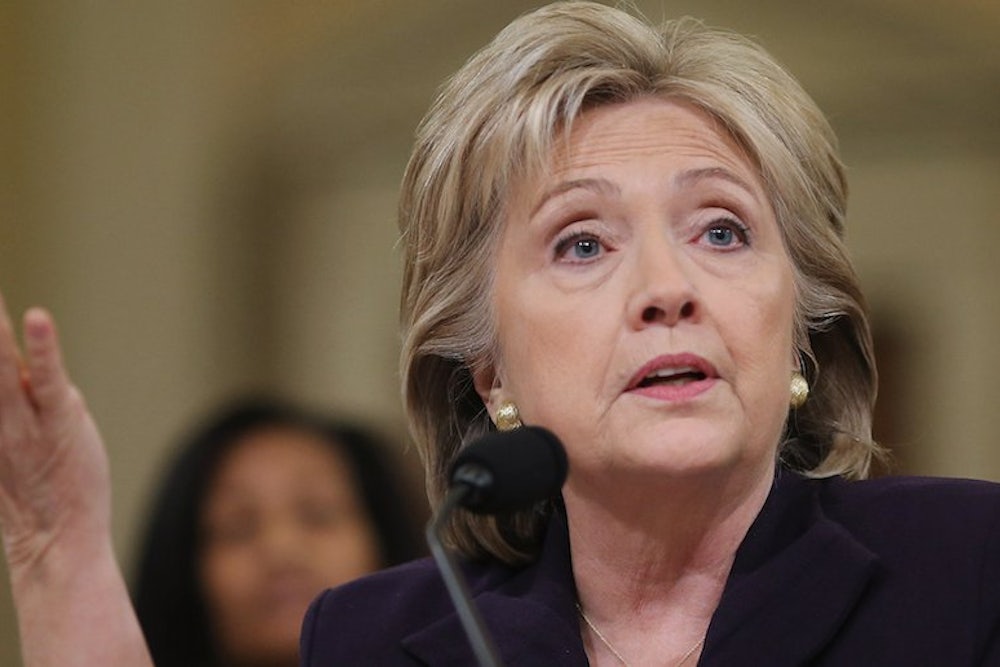The remaining candidates in the race for the Democratic nomination have clear and well-documented differences on a number of issues, most of which matter little in the face of political reality. Hillary Clinton, Bernie Sanders, and Martin O’Malley all want to move the country in a more progressive direction than would be possible if any of them were elected president.
The question, then, is how to work within those limits. And this is an area in which Clinton is genuinely conservative, in a way Sanders and O’Malley are not, and it has to do with the proper use of the White House's podium to change the national political culture.
On almost every issue of public contention, including same-sex marriage, immigration, marijuana legalization, and the death penalty, Clinton has adopted a stance of convenient federalism, deferring to the states rather than choosing to nudge them in the right direction. Clinton’s critics tend to characterize this facet of her politics as cynical, poll-driven, and unprincipled. Whether you think that’s fair or not, her laissez-faire approach to these issues, in both the past and the present, is undeniable.
Given the presidency and state of national politics she is likely to inherit, this is an approach to politics she should rethink.
In his second term, President Obama’s grip on Congress slipped completely. His influence over national affairs became relegated to the bully pulpit and the inherent powers of the executive branch. He has used the latter tool effectively, and Clinton has promised to expand on the model he created. But her record suggests she’ll allow the former to go to waste.
Though it has no inherent power, the president’s megaphone is a powerful one, and through it Obama been able to advance objectives foreclosed upon by Congress at the state level, particularly on gay marriage but even arguably on gun control.
This is a fine if often thankless strategy for any relatively popular president who happens to be obstructed from moving national legislation, like a minimum wage increase, through Congress. But to make a real impact on the country’s political culture, it also requires the president to have a real stake in outcomes that can’t be realized in most states, and might not be politically popular everywhere.
Reacting to O’Malley’s support for abolishing the death penalty, Clinton argued, “Of course the death penalty is primarily a state decision and I do think states need to look carefully about whether they need to continue it, how it is applied, whether there is discriminatory effects. I was talking about the federal government and it's limited, but I don't think we should abolish it in the federal government but we ought to reserve it primarily for terrorists and related incidents like the Boston Marathon bomber. And so that's why I think we should really be limiting it, but not abolishing it when it comes to applying it.”
She has adopted a similar stance on marijuana legalization. She also famously waffled, deferring to states' rights, when asked in 2007 whether unauthorized immigrants should be allowed to obtain driver's licenses.
Even if you stipulate for the sake of argument that the federal government has little power to motivate states to change any of their laws, that in no way controls how the president uses organizing tools to build support for local initiatives. To dismiss something as a state issue and leave it at that is to harm its cause.
It’s especially damaging in the current climate. Over the past seven years, Democrats have lost hundreds of state legislature seats. As Matthew Yglesias wrote at Vox recently, Republicans enjoy unified political control of more than two dozen states. Democrats currently settle for just four.
If same-sex marriage were still considered a state issue, it would continue to face stiff resistance at that level. If the president of the United States wanted no part of it, progress toward equality would stall further. Relegating the death penalty and other issues to this same status is to leave them in largely Republican hands, or in the hands of state activists with inadequate resources.
I expect Hillary Clinton will make creative use of executive power if she becomes the president. I even expect she'll do a good job rehabilitating the Democratic Party at the state level. But if she isn’t willing to get out in front of contentious state-based concerns, I imagine many of those efforts will falter or stagnate on her watch.
